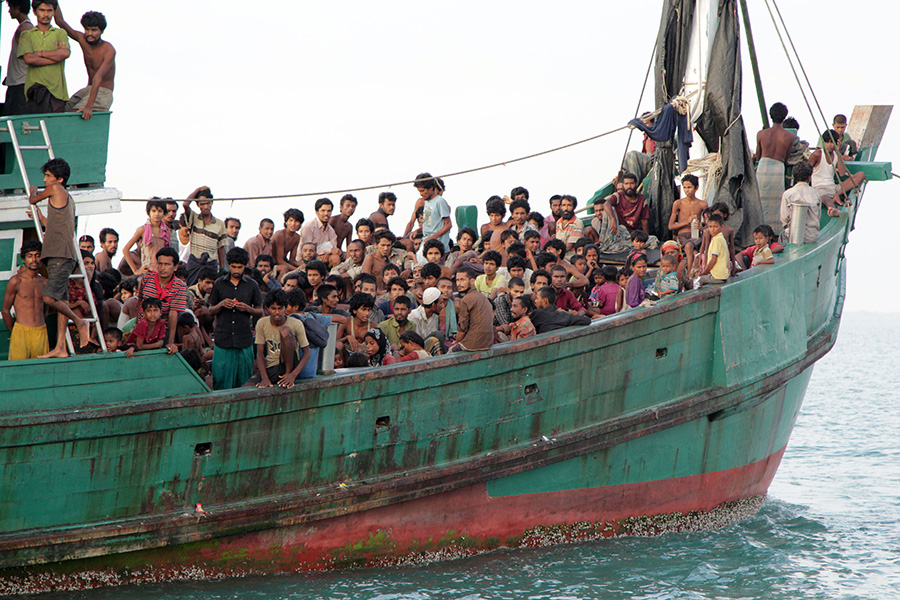In recent weeks, violence and panic have gripped parts of the Southeast Asia nation of Myanmar (also called Burma). In late August, dozens of people were killed in clashes between Rohingya militants and government forces in western Myanmar. Since then, Rohingya villages have been attacked by the Myanmar military and local people hostile to the Rohingya. Hundreds of thousands of Rohingya have been forced to flee to refugee camps in nearby Bangladesh. The violence has also displaced thousands of other people who live in the area of conflict. Refugee camps are filled beyond capacity, creating dangerously unsanitary conditions, and the camps lack enough food, water, and medicine.
Sometimes called “the world’s most persecuted minority,” the Rohingya are a Muslim-majority ethnic group in Buddhist-majority Myanmar. Rohingya have lived for centuries in Myanmar, where their community numbers some 1 million people. Most Rohingya live in the northern part of Rakhine State near the border with Bangladesh. Myanmar does not recognize the Rohingya as legal citizens. Instead, the government considers them to be illegal immigrants. Tensions and conflicts have occurred between Muslim Rohingya and Buddhist and Hindu Rakhine people for decades.
The Myanmar government blames the recent escalation of violence on rebels of the militant Arakan Salvation Rohingya Army (ARSA), who have attacked police posts and been accused—often without proof—of massacring Buddhists. Many outside observers, however, and the Rohingya themselves, say the ARSA attacks are largely a response to a government campaign to drive the minority group from the country. They accuse the military and Buddhist mobs of beating and killing Rohingya civilians and burning their villages. The government claims that it is targeting only ARSA militants—it even says the Rohingya are burning their own villages. A United Nations (UN) human rights official estimates that as many as 1,000 people have died in the recent violence, most of them Rohingya. Myanmar leader Aung San Suu Kyi has been criticized for her lack of response to the Rohingya crisis, and the truth behind the violence remains unclear.

After Burma won independence in 1948 (the nation changed its name to Myanmar in 1989), the government acknowledged the citizenship of the various Muslim groups living within the country. In 1962, however, a new military government took over, and it refused to recognize the Rohingya as citizens. Since then, Rohingya have consistently been denied many rights and services by the government. In 2012, rioting broke out between Rohingya and Rakhine Buddhists. More than 140,000 Rohingya fled that violence, and many thousands have since left each year, seeking refuge in Bangladesh, Thailand, Indonesia, or Malaysia. The current plight of the Rohingya has sparked protests in many Muslim-majority nations and other places around the world.
Untitled Document
Can't view the linked articles? Subscribe to World Book Online

World Book Online delivers a progressive sequence of core databases supported by supplemental
tools, such as language translation, graphic organizers, and unique Webquests. Moving from
Early World of Learning to World Book Advanced, World Book Online aligns end-users with their
appropriate learning levels. Each stand-alone site provides additional features to support the
needs of users’ specific capabilities.
The World Book Difference
World Book combines cutting-edge technology with traditional editorial excellence to produce
authoritative, trustworthy, and unbiased content. The digital content is updated in real time and
carefully curated for each learning level. Accessible 24/7, the content is available on a variety of devices.
World Book Online combines 21st-century instructional techniques with timely information.
By breaking down complex topics and using easily understandable text, World Book Online helps to
build fluency and increase comprehension. Featuring single sign-on capability, these sites are paired
with highly visual content to engage even the most reluctant reader. Our collection of resources kindles
a lifelong learning experience for every user. This adherence to clarity, currency, and accuracy makes
World Book’s digital offerings an information hub for the classroom, library, and beyond.
Image 1: Rohingya people who have fled Myanmar await food outside the Kutupalong refugee camp in Cox’s Bazar, Bangladesh, on Sept. 20, 2017. Credit: © Sk Hsan Ali, Shutterstock
Image 2: Myanmar Rohingya refugees crowd a boat off the coast of Indonesia. Credit: AP Phot